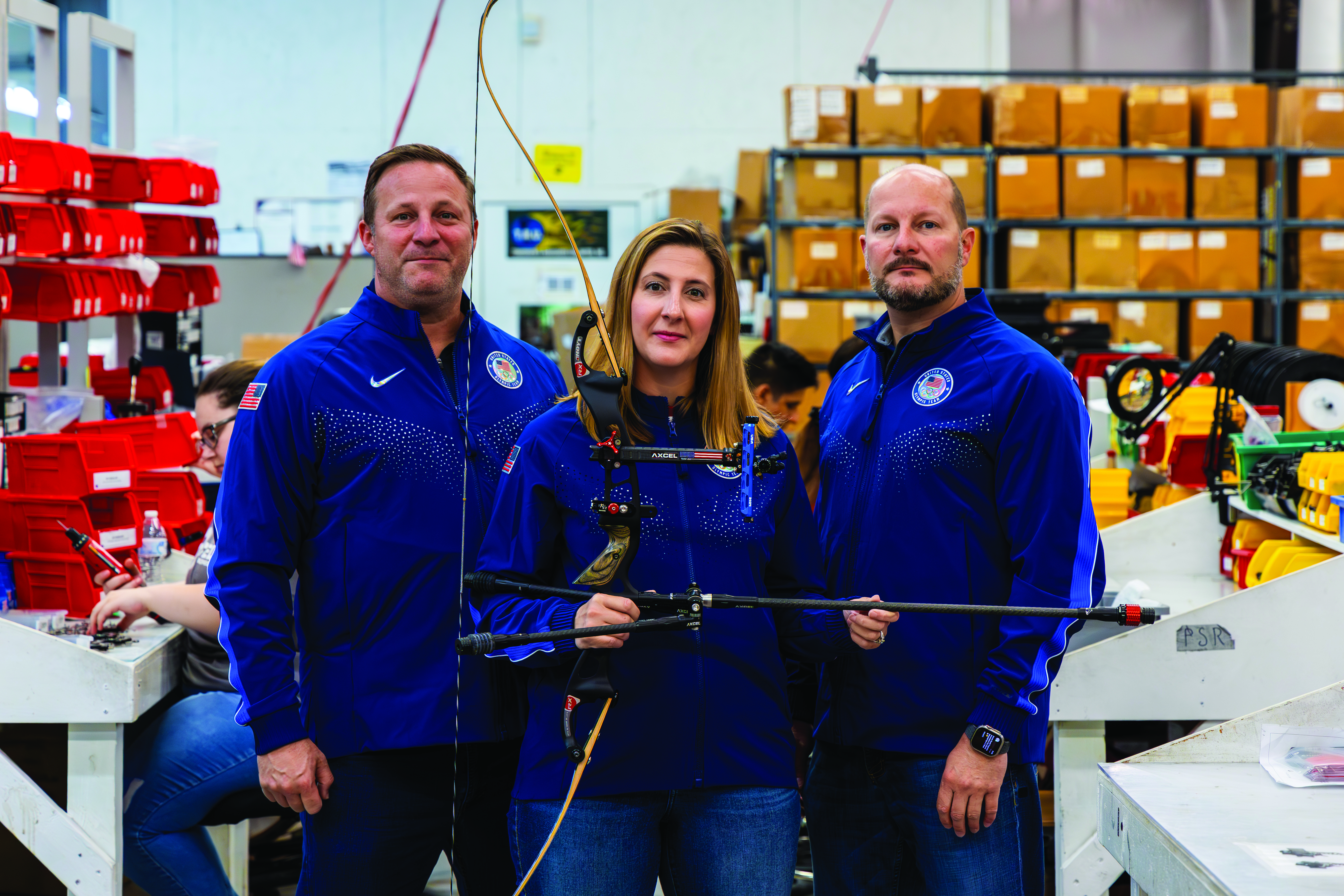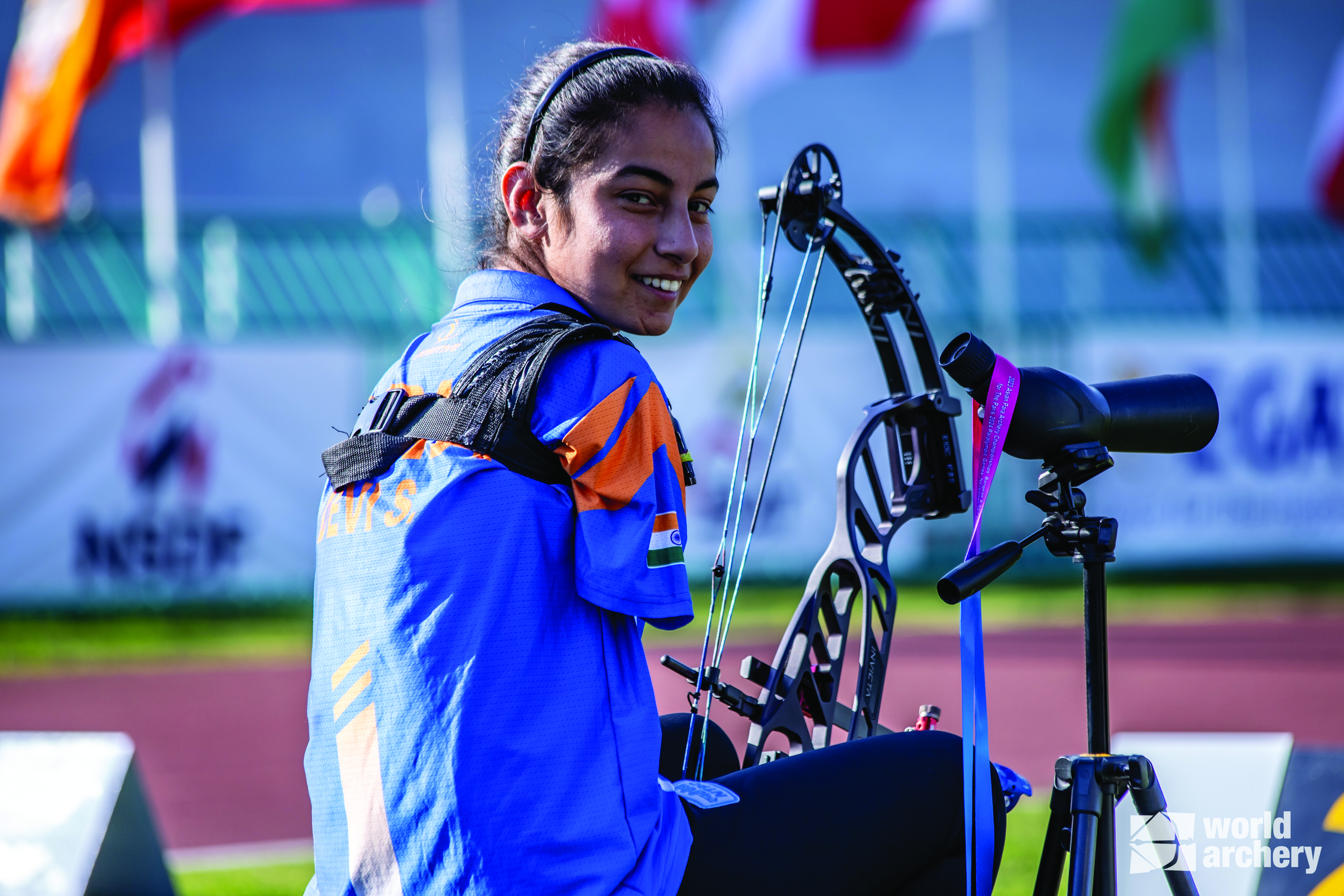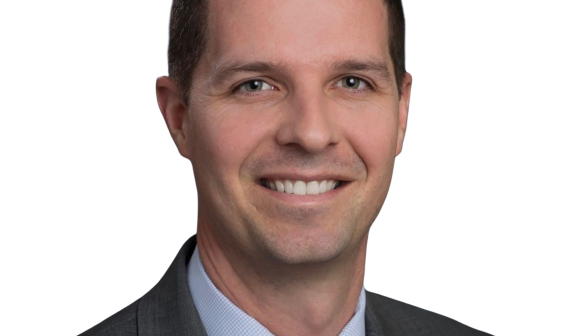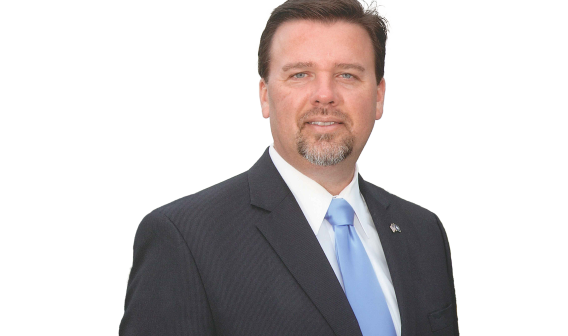Hitting a Lofty Target
T.R.U. Ball/AXCEL Archery uses VEDP trade programs to reach Olympians from its Amherst County home

T.R.U. Ball/AXCEL Archery, Amherst County
Imagine using a bow and arrow to hit a target the size of a DVD that’s 70 meters away — the wingspan of two Boeing 737 airplanes side by side.
That’s the challenge faced by Olympic archers. Ben Summers and his family know it well. In just a couple decades, they have grown what began as a small machine shop in Amherst County, across the James River from the city of Lynchburg, into T.R.U. Ball/AXCEL Archery (AXCEL), a global leader designing and building sights, scopes, and stabilizers used by Olympic medalists and recreational archers around the world.
But prior to this year, one target remained elusive. While elite male Olympians had won many medals using AXCEL equipment, few female Olympic medalists used their equipment, and the best female archers in the world were in South Korea, whose culture and business practices were unfamiliar for the company.
“We had a lot of sponsored athletes, but if you follow Olympic archery at all, the Korean teams dominate archery. So we identified, with the help of VEDP, South Korea as our No. 1 country to really try to influence,” said Summers, one of the company’s three vice presidents.
In 2021, Summers found the tool he needed to hit the bullseye: the Virginia Leaders in Export Trade (VALET) program offered by the Virginia Economic Development Partnership (VEDP). The program provides up to $30,000 in funding but, more critically for AXCEL, its experts sighted the best targets downrange, recommending key people and companies during the COVID-19 pandemic, when meeting in person was a challenge.
“Korea had been locked down and the trade mission from Virginia went virtual — with one notable exception,” Summers said. “I was the only member of that trade delegation from Virginia to actually go because it was really, really difficult to get into Korea at the time. We worked collaboratively with VEDP to find the right people.”
A Well-Timed Pivot
Summers’ father, Greg Summers, was a master machinist at a machine shop in downtown Lynchburg, becoming so proficient he was asked to train others. Then, at age 31 with five children he hoped might someday take over, Greg launched S&S Machine, Inc., placing a second mortgage on his home and buying a few machines. While he learned business acumen, he succeeded through perseverance. “I think it took him several months before he actually got his first job,” Ben Summers recalled.
A decade later, Summers expanded into archery by necessity. S&S Machine was winding down one of its biggest contracts, with a company that supplied nuclear fuel to the U.S. Navy for submarines and aircraft carriers. The end of that contract might mean the end of the line for 50 machinists, so the company pivoted, filling a gap in the growing archery marketplace.
Within two or three years, the archery business was flying. Part of that was shoe-leather work — the family worked hard to develop relationships with a network of dealers. Part was tactics — take aim at top tournament archers using sponsorships. “Those professionals were the leading influencers of their time. And this was before social media. They were the grassroots marketing for our products,” Ben Summers said.
The family also had a ringer: Brandon Reyes, a leading tournament archer, is Ben’s brother-in-law. “If you could get a few professional big names using your equipment and endorsing it, then that would go a long way for people who wanted to get into it as a hobby,” Summers said.
As their product line expanded, so too did their penetration of the American marketplace. Since their first year, sales have increased more than 100-fold. Said Summers: “Anywhere that sells quality archery equipment will have our products.”
AXCEL’s growth has protected between 60 and 70 machinists, programmers, and designers in an era in which employment numbers across the industry have plunged because of computerization — one computer now does work that used to be done by five to 10 machinists. The company employs as many as 130 people in summer before peak hunting season. Its growth in archery has made that side of the business more than six times as large as the machine shop.
In 2011, doctors discovered Greg had pancreatic cancer, a diagnosis with five-year survival rates ranging between 3–16%.
Greg was fortunate. Physicians at the Johns Hopkins Hospital discovered his cancer had not spread. Still, that brush with death changed him. He had been a workaholic, someone who had not really vacationed since starting his business in 1985. So he decided to take his first vacation.
“All of a sudden he decided that he was going to go to Europe to exhibit at an archery tournament,” Ben Summers recalled.
At that year’s World Archery Championships in Turin, Italy, Greg Summers met Korean archer Oh Jin-hyek. Months later, Oh bought an AXCEL sight, which he used to win individual gold at the 2012 London Olympics.

Sheetal Devi made history at the 2024 Paralympics when she became India’s youngest-ever medalist while using AXCEL equipment.
Finding the Sport’s Heavy Hitters
Having gotten into the Korean roster, AXCEL looked to secure further impressive connections. Their targets included Kim Woo-jin, the first man since 1985 to win the World Archery Championships twice and who set a world record score in the 2016 Olympics. As part of Virginia’s trade mission to Korea, Kim drove three hours to meet Ben Summers, then signed a contract through 2025. Kim would go on to win three golds in the 2024 Paris Olympics, including the individual competition on his final arrow, defeating USA’s Brady Ellison, also sponsored by AXCEL.
VALET helped Summers meet a vice president of Hyundai Motor Group who later became vice president of the global federation that has since 1931 promoted and regulated the sport, Switzerland-based World Archery. Han Kyu-hyung of Hyundai made contact with coaches to set up meetings with that country’s elite teams, one with Hyundai Steel and the other with Hyundai Mobis, which provides parts and services to its parent company.
That led to a meeting with a leading Korean coach, who explained that coaches across Asia believed that women archers always used sights made by a Japanese maker because they were lighter — a belief that Summers showed wasn’t true. The meeting proved persuasive: archer Lim Si-hyeon won three gold medals at the Paris Olympics and her Korean teammate Jeon Hun-young one, both using AXCEL sights.
“The success of these two women helped us break a barrier,” Summers said.
AXCEL archery equipment was also used in Paris by medal-winning Paralympians. American archer Matthew Stutzman, who was born without arms, won gold using his legs and feet to hold the bow and launch the arrow in what might have been the final competition for the 41-year-old. Also winning a medal was 17-year-old Sheetal Devi from India, that country’s youngest-ever medalist, who with her team captured a bronze. Like Stutzman, Devi was born without arms.
Convincing world-class archers to use AXCEL equipment opens up marketplaces for the broader consumer market, which includes hunters and recreational archery enthusiasts. “The athletes are kind of doorways,” Summers said.
Thanks to a family’s determination and smart sighting by VALET, a Virginia archery business has used those doorways to go global.




